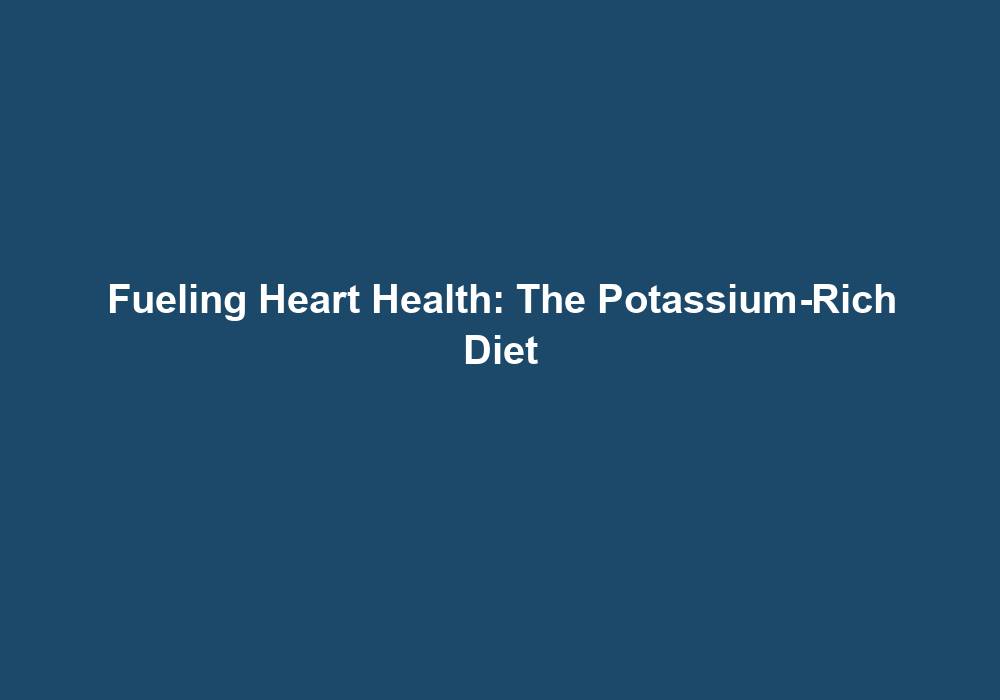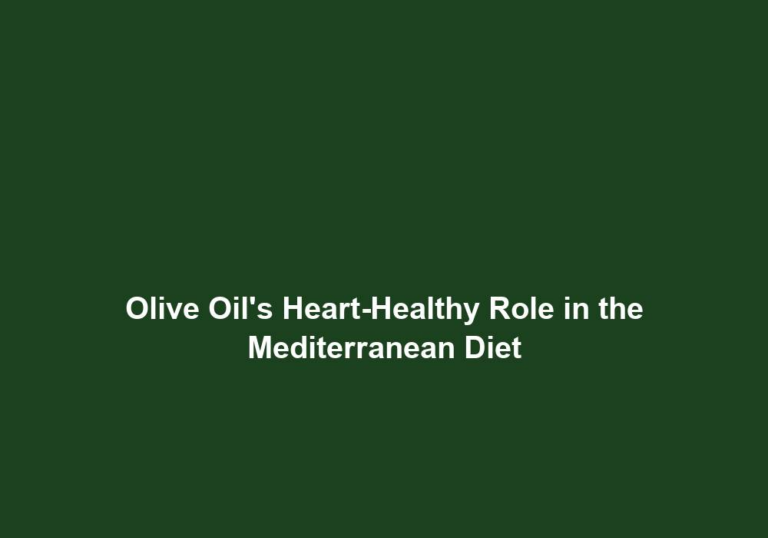Fueling Heart Health: The Potassium-Rich Diet
Maintaining a healthy heart is crucial for overall well-being. In addition to regular exercise and a balanced lifestyle, diet plays a vital role in promoting heart health. One nutrient that significantly contributes to cardiovascular well-being is potassium. In this article, we will explore the benefits of a potassium-rich diet and how it can fuel heart health.
Understanding Potassium and its Role in Heart Health
Potassium is an essential mineral that our bodies require for various physiological functions. It acts as an electrolyte, helping to maintain fluid balance, conduct nerve impulses, and support proper muscle function, including the heart.
When it comes to heart health, potassium plays a significant role in regulating blood pressure. It helps counteract the negative effects of sodium, promoting a healthy blood pressure level. This is crucial because high blood pressure is a primary risk factor for heart disease.
The Importance of a Potassium-Rich Diet
Consuming a diet rich in potassium offers numerous cardiovascular benefits. Let’s delve into some compelling reasons why a potassium-rich diet is essential for fueling heart health:
1. Blood Pressure Regulation
As mentioned earlier, potassium helps regulate blood pressure levels by counteracting the effects of sodium. Adequate potassium intake relaxes the walls of blood vessels, reducing tension and promoting proper blood flow. This, in turn, lowers the risk of hypertension, stroke, and other heart-related complications.
Additionally, potassium supports the balance of other electrolytes, such as calcium and magnesium, which are crucial for maintaining healthy blood pressure. By including potassium-rich foods in your diet, you can effectively manage your blood pressure and protect your cardiovascular health.
2. Reduced Risk of Stroke
Stroke, often caused by high blood pressure, is a severe medical condition that affects the blood supply to the brain. Studies have indicated that individuals with higher potassium intake have a lower risk of stroke. Potassium’s ability to regulate blood pressure and maintain proper blood flow contributes to this risk reduction.
Furthermore, potassium has shown to have anti-inflammatory properties, which can further protect the blood vessels from damage and reduce the risk of stroke. By incorporating potassium-rich foods into your diet, you can potentially safeguard your cardiovascular health and minimize the risk of stroke.
3. Improved Heart Rhythm
Potassium is crucial for maintaining proper heart rhythm or the electrical activity of the heart. It helps in the smooth functioning of the heart by facilitating the transmission of electrical signals. A deficiency in potassium can lead to irregular heart rhythms, known as arrhythmias, which can be life-threatening.
By consuming a diet rich in potassium, you can help prevent such complications and ensure a healthy heart rhythm. Potassium works alongside other electrolytes, such as calcium, to facilitate the contraction and relaxation of the heart muscle. This ensures that the heart beats in a coordinated and efficient manner, promoting optimal cardiovascular function.
4. Enhanced Nutrient Delivery
Potassium not only plays a direct role in heart health but also indirectly affects the overall cardiovascular system. By maintaining optimal blood pressure and promoting healthy blood vessels, potassium ensures efficient nutrient and oxygen delivery to the heart and other organs.
Furthermore, potassium supports the function of endothelial cells, which line the blood vessels and contribute to their health and flexibility. This helps prevent the build-up of plaque and the development of atherosclerosis, a condition that narrows the arteries and restricts blood flow. With improved nutrient delivery, the cardiovascular system stays strong and healthy.
Potassium-Rich Foods to Include in Your Diet
Now that we understand the importance of a potassium-rich diet for heart health, let’s explore some of the best sources of this essential mineral:
- Bananas: Known for their high potassium content, bananas are a convenient and easily accessible source of this nutrient. They are also rich in fiber, which further supports heart health. Incorporate them into smoothies, cereals, or enjoy them as a snack.
- Sweet Potatoes: These delicious root vegetables are not only packed with potassium but also provide valuable vitamins and antioxidants. Roast or bake them for a nutritious side dish or use them as a base for hearty meals.
- Spinach: Leafy greens like spinach are an excellent source of potassium, as well as other heart-healthy nutrients like magnesium and folate. Add spinach to salads, soups, omelets, or sauté it as a nutritious side dish.
- Avocados: Along with being a great source of heart-healthy fats, avocados are rich in potassium. They also contain dietary fiber, vitamins, and minerals that support cardiovascular well-being. Enjoy avocados in salads, sandwiches, or as a creamy spread.
- Oranges: These citrus fruits not only provide a refreshing burst of flavor but are also a good source of potassium. Additionally, they are high in vitamin C, which further supports heart health. Snack on oranges or incorporate them into salads and smoothies.
Apart from these, other potassium-rich foods include tomatoes, lentils, yogurt, salmon, and almonds. By incorporating these foods into your daily meals, you can ensure an adequate intake of potassium and promote heart health.
Tips for Incorporating Potassium-Rich Foods in Your Diet
Here are some practical tips to help you increase your potassium intake:
- Start your day with a potassium-rich fruit smoothie or a bowl of yogurt topped with bananas or berries. This will give you a nutritious and delicious kick-start.
- Include a variety of vegetables, especially leafy greens, in your salads, soups, stir-fries, or as side dishes. Experiment with different cooking methods and seasonings to enhance the flavors.
- Snack on potassium-rich foods such as nuts, seeds, and dried fruits instead of processed snacks. Keep a mix of these handy for a quick and nutritious boost throughout the day.
- Experiment with recipes that feature sweet potatoes or avocados as the main ingredient. From sweet potato fries to avocado toast, there are plenty of delicious and heart-healthy options to explore.
- Opt for potassium-fortified foods, such as cereals or milk alternatives, to further boost your intake. Check the labels for potassium content and choose products that fit your dietary preferences.
Conclusion
In conclusion, consuming a potassium-rich diet is vital for fueling heart health and reducing the risk of cardiovascular diseases. By incorporating potassium-rich foods into your meals, you can regulate blood pressure, enhance heart rhythm, and improve overall cardiovascular function. Remember to consult with a healthcare professional or a registered dietitian to determine your specific potassium needs and ensure a balanced diet that suits your individual requirements. So, start prioritizing potassium-rich foods today and take a significant step towards a healthier heart!







